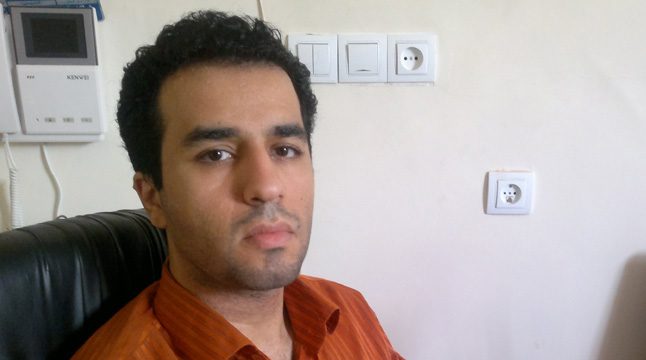Blogger Arrested Amid Iran’s December 2017 Protests Vows to Hunger Strike Until Freedom or Death

Agents Threaten to Arrest Wife For Speaking Out About Peyman Roshanzamir’s Case
A blogger who never served a previous prison sentence on the condition that he would not engage in political activities was taken back to prison amid Iran’s December 2017 protests.
Peyman Roshanzamir has been refusing food at the Central Prison in Ahvaz, Khuzestan Province, since February 28, 2018, the Center for Human Rights in Iran (CHRI) has learned. In an open letter, he stated that agents at the prison had threatened his wife with arrest for publicizing the news about his hunger strike.
“Two days ago, someone from the Intelligence Ministry and last night from the head of prison security came to see me and all I heard from them were insults and threats,” said Roshanzamir in an open letter from prison dated March 10, a copy of which was obtained by CHRI.
“One of the agents asked me to face the wall so I wouldn’t see him,” he added. “I refused. Then all he said was, ‘We will arrest your wife for spreading the news about your hunger strike. You’re creating problems for her.’”
“I said, ‘Definitely do that so that the world can know better who you are,’” said Roshanzamir in his letter.
“I am simply asking the authorities to agree with my request for conditional release,” he added. “This is my right as a first-time offender.”
Agents of the Intelligence Ministry in the city of Ahvaz previously arrested Roshanzamir, 30, on January 3, 2011, for writing blog posts that were critical of state policies.
In May 2011 he was sentenced to 17 months in prison for the charges of “insulting the supreme leader” (12 months) and “propaganda against the state” (5 months).
An appeals court later confirmed his sentence but it was put on hold after he pledged not to engage in any political activities, his wife told the London-based Kayhan website on March 10, 2018.
His wife, who was not named in the interview, added that even though her husband had refrained from engaging in politics, he was re-arrested in early January 2018 after being summoned for questioning in the aftermath of the protests that occurred in various cities in Iran that month.
According to Article 134 of Iran’s Islamic Penal Code, prisoners convicted on multiple charges may only serve the most severe sentence, which in Roshanzamir’s case would be 12 months.
In his open letter, Roshanzamir stated that he is eligible for parole based on the time he served in detention in 2011 and after he was re-arrested in 2018.
“If the authorities had accepted my request and applied Article 134 to my case, I could have been freed by now,” he added. “It seems like no one here wants to resolve issues without generating a crisis and even though I’m suffering from the severe effects of 11 days of hunger, I will not stop under any circumstances other than freedom.”
“The officials are well aware of this,” he added. “The responsibility for my death will be on all those who could have quickly approved my release but didn’t.”






